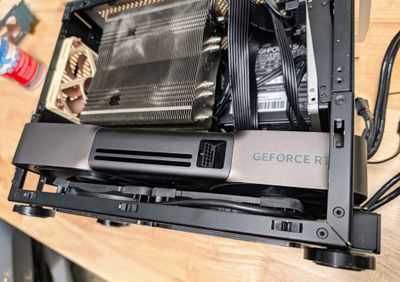
The Nvidia RTX 5090 FE barely fit my 12.7-liter small form factor case, but using it was a dream.
In 2022, I wrote that GPUs were headed in the wrong direction — their price, size, and power consumption were off the charts. And while I still believe that’s true, I can now confirm Nvidia has at least made one phenomenal exception in the size category: the two-slot “Founder’s Edition” of its RTX 5090 graphics card, on sale January 30th.
The last time Nvidia made a two-slot flagship graphics card, it was the 2021 RTX 3080 Ti FE — the 3090, 4080 and 4090 were gigantic by comparison.
So, while my colleague Tom Warren was busy writing his full review of the new 5090 using the best gaming CPU, I wedged one of the $2,000 cards into my own aging mini desktop. I wanted to see whether the surprisingly small flagship GPU was truly ready for small form factor (SFF) cases — or, whether my beloved 12.7-liter Ncase M1 chassis is well and truly obsolete.
To my surprise, it worked: all I needed was a new power supply to turn my backpack-sized daily driver into one of the most powerful gaming PCs in the world. At 4K resolution, I’m typically seeing more than double the framerate I get with an RTX 3080 Founder’s Edition, one of the last cards that could comfortably fit in the Ncase M1, to give you some idea.
But I’m not going to suggest you do the same! For starters, we’re talking about a two thousand dollar graphics card and a one thousand watt power supply — which I actually saw consuming up to one whole kilowatt (as measured by my trusty Kill A Watt at the wall) in my Cyberpunk 2077 tests. With an RTX 3080, my system consumed over 200 fewer watts. Not that I minded having a space heater on these cold January days!
But I literally had to wedge the 5090 into my Ncase M1 to make it fit, and even remove and reattach the video card’s bracket inside my case. And even then I couldn’t fully seal my desktop because the GPU’s new 12V-2×6 power connector occupies a chunk of space where my case’s side panel is supposed to go. You’ll want an SFF-ready case with more clearance than I have.


Still, leaving my desktop’s guts exposed was a small price to pay to toy with this much power! It’s enough to play games at 4K at their maximum settings, save for full ray tracing (aka path tracing). It’s even got enough horsepower to turn on path tracing, too, if you combine it with dynamic upscaling and/or fake frame generating tech.
I normally play Helldivers 2 on an old 3060 Ti graphics card I bought for just $400, where I’m forced to rely on those tricks just to get smooth 4K-ish gameplay. It was quite nice, if expected, to finally max out that game on the 5090 instead.
What I didn’t expect: my aging, space-constrained AMD 5800X desktop delivered the same performance as Tom’s open-air testing rig in quite a few of our 4K gaming benchmarks. I knew it was possible, but it goes to show that Nvidia’s fancy two-slot “double flow through” cooler really is suitable for SFF PCs.
It depends on whether your games are CPU limited, of course, as my older PC does have a slower CPU — and most of today’s games tend to be at least somewhat CPU limited at 1440p resolution, where Tom’s system often pulled far ahead by 20 to 60 percent.
Facing down the alien swarms and flying particles in Returnal, for example, Tom pulled 201 frames per second at 1440p while my diminutive desktop managed just 169fps; in Horizon Zero Dawn Remastered, the most CPU-limited game we’re testing, my bottlenecked system averaged just 123fps to Tom’s 200fps.
But that’s still over 120fps on max settings, more than enough for butter-smooth sessions of these single-player games! And if I were to pair my tiny tower with a 4K TV in my living room instead of a 1440p monitor, as many SFF PC builders might like to do, I’d have a blast — my 4K results always averaged over 60fps, and were often within just a few FPS of Tom’s open bench.
And again, I’m typically seeing the RTX 5090 delivering more than twice the horsepower of an RTX 3080, making it quite the upgrade for SFF fans with deep pockets. That’s not necessarily something to celebrate, though: the $2,000 RTX 5090 admittedly costs more than twice as much as a $700 RTX 3080 did at its 2020 launch, and will be out of reach for most gamers even if shortages and scalpers don’t rear their ugly heads.
When it comes down to it, I think the Nvidia GeForce RTX 5090 is a damn cool piece of kit. It makes me want to quote Ferris Bueller’s Day Off because it is so choice. It’s a noteworthy exception to the very annoying trend of GPUs expanding in every direction. But at $2,000, 575 watts of power by its lonesome, and with no other Nvidia board partner offering anything nearly as compact, it’s the exception that proves the rule.
Photography by Sean Hollister / The Verge

Recent Comments